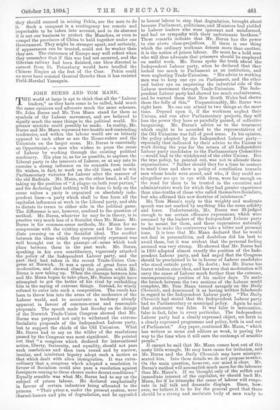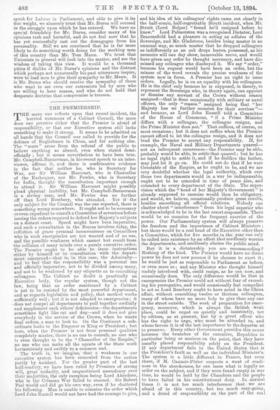JOHN BURNS AND TOM MANN. T HE world at large is
apt to think that all the " Labour leaders," as they have come to be called, hold much the same opinions and advocate much the same schemes. Mr. John Burns and Mr. Tom Mann stand for them as symbols of the Labour movement, and are believed to signify much the same things in the political world. No greater mistake could possibly be made. In reality, Mr. Burns and Mr. Mann represent two hostile and contending tendencies, and within the labour world are as bitterly opposed to each other as are the Home-rulers and the Unionists on the larger scene. Mr. Burns is essentially an Opportunist,—a man who wishes to press the cause of Labour by working through the existing political machinery. His plan is, as far as possible, to capture the. Liberal party in the interests of Labour, or at any rate to inside. He a strong influence on its counsels from nside. He wishes, in fact, to work on the old lines, and to win Parliamentary victories for Labour after the manner of the old Radicals. Mr. Mann, on the other hand, is all for taking up the position of "A plague on both your parties," and for declaring that nothing will be done to help on the cause unless a party is organised on absolutely inde- pendent lines—a party which shall be free from all the capitalist influences at work in the Liberal party, and able to dictate its terms to either side in the political game. The difference is not, however, confined to the question of method. Mr. Burns, whatever he may be in theory, is in practice very much less of a Socialist than Mr. Mann. Mr. Burns is for common-sense methods, Mr. Mann for no compromise with the existing system and for the imme- diate pressing on of the Socialist ideal. The conflict between the ideas which they respectively represent was well brought out in the passage - of - arms which took place between them in the past week. Mr. Burns, speaking in his own constituency, vigorously attacked the policy of the Independent Labour party, and the part they had taken in the recent Trade-Union Con- gress at Norwich. It was a speech of great force and moderation, and showed clearly the position which Mr. Burns is now taking up. When the cleavage between him and Mr. Mann began to take place, Mr. Burns might have attempted to get the better of his rival by outbidding him in the saying of extreme things. Instead, he wisely refused to enter into such a competition. The result has been to throw him into the arms of the moderates of the Labour world, and to accentuate a tendency already apparent in favour of common-sense and reasonable proposals. The speech made last Sunday on the doings of the Norwich Trade-Union Congress showed that Mr. Burns was prepared not only to withstand the extreme Socialistic proposals of the Independent Labour party, but to support the chiefs of the Old Unionism. What Mr. Burns had to say on the wilder of the resolutions passed by the Congress was most significant. He pointed out that " a congress which declared for international action, liberty, fraternity, and equality, should not pass such resolutions and then turn round and by narrow, insular, and intolerant bigotry adopt such a motion as that which dealt with alien immigration. It was extra- ordinary that a congress which adopted a resolution in favour of Socialism could also pass a resolution against foreigners coming to these shores under decent conditions." Equally sensible was what Mr. Burns had to say on the subject of prison labour. He declared emphatically in favour of certain industries being allocated to the prisons. " Their prison s, under the present system, were charnel-houses and pits of degradation, and he appealed to honest labour to stop that degradation, brought about because Parliament, politicians, and Ministers had yielded to Labour leaders who were ignorant and uninformed, and had no sympathy with their unfortunate brethren." These remarks indicate that Mr. Burns has the power to rise above class-prejudices. If there is one thing which the ordinary workman detests more than another, it is the notion of prison labour. He must be a bold man who will thus advocate that prisoners should be employed on useful work. Mr. Burns spoke the truth about the Independent Labour party, when he declared that they looked too much to Parliament as an institution, and were neglecting Trade-Unionism. " His advice to working men was to keep one eye on Parliament, and the, other and better eye on improving the industrial side of the Labour movement through Trade-Unionism. The Inde- pendent Labour party had showed tee) much exclusiveness, and he warned them that New South Wales had shown them the folly of this." Unquestionably, Mr. Burns was right here. No one can attend to two things at the same time. Depend upon it, if the workmen neglect their Unions, and run after Parliamentary projects, they will lose the power they have so painfully gained, of collective bargaining. Mr. Burns's advice as to the treatment which ought to be accorded to the representatives of the Old Unionism was full of good sense. In his opinion, the policy adopted by the Independent Labour party— especially that indicated by their advice to the Unions to work during the year for the return of all Independent Labour party candidates to the Parliamentary Committee —would lead to the withdrawal of the older Unions. But the true policy, he pointed out, was not to alienate these organisations. " Rather should they for a time be content to mark time and show a policy of conciliation towards men whose heads were sound, and who, if they could not altogether see eye to eye with them, were far enough on the road for them to be trusted in the executive and administrative work for which they had greater experience than nine-tenths of those who called themselves Socialists, but who affirmed this new doctrine of intolerance."
Mr. Tom Mann's reply to this weighty and moderate speech was not marked by anything like the same solidity and force. Unfortunately, Mr. Burns was ill-judged enough to use certain offensive expressions, which were assumed by the leaders of the Independent Labour party to be meant for them, and these expressions naturally tended to make the controversy take a bitter and personal tone. It is true that Mr. Mann declared that he would not deal in personalities, and doubtless did his best to avoid them, but it was evident that the personal feeling aroused was very strong. He showed that Mr. Burns had in 1890 adopted almost exactly the position of tbe Inde- pendent Labour party, and had urged that the Congress should be proclaimed to be in favour of Labour candidates who stood outside party. No doubt ; but Mr. Burns has learnt wisdom since then, and has seen that moderation will carry the cause of Labour much further than the extreme, uncompromising position of his earlier days. To make the breach between the two sections of the Labour world complete, Mr. Tom Mann turned savagely on the Daily Chronicle, and denounced it as having written falsehoods in regard to the Independent Labour party. "The Daily Chronicle had stated that the Independent Labour party had no Parliamentary or municipal policy. Again he said that statement was false. It was false in insinuation, false in fact, false in every particular. The Independent Labour party had a clearly expressed object, set forth in a clearly expressed programme and policy, both in and out of Parliament." Any paper, continued Mr. Mann, " which has writers so mean and editors so weak, is paving the way to the time when it will earn the contempt of sensible people." It cannot be said that Mr. Mann comes best out of this nasty little wrangle. He may have cause for irritation, and Mr. Burns and the Daily Chronicle may have misrepre- sented him. Into these details we do not propose to enter. On the main question, however, our mind is clear. Mr. Burns's method will accomplish much more for the labourer than Mr. Mann's. If we thought only of the selfish and immediate interest of the capitalist, we should back Mr. Mann, for if he triumphs the cause of labour will evapo- rate in tall talk and dramatic displays. Since, how- ever, we believe it to be for the general good that there should be a strong and moderate body of men ready to speak for Labour in Parliament, and able to give it its due weight, we sincerely trust that Mr. Burns will succeed in the struggle upon which he has entered. We have no special friendship for Mr. Burns, consider many of his opinions rash and harmful, and do not feel sure that he has yet successfully cast out the demagogue from his personality. Still we are convinced that he is far more likely to do something worth doing for the working men of this country than Mr. Tom Mann. We trust that Unionists in general will look into the matter, and see the wisdom of taking this view. It would be a thousand pities if dislike of Mr. Burns's opinions and the distrust which perhaps not unnaturally his past utterances inspire, were to lead men to give their sympathy to Mr. Mann. It is Mr. Burns who should receive the sympathy of those who want to see even our extremists led by men who are willing to hear reason, and who do not hold that desperate doctrine that compromise is treason.



















































 Previous page
Previous page